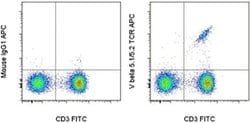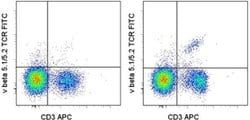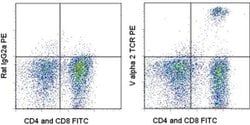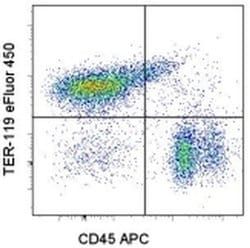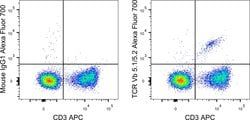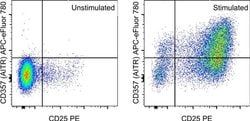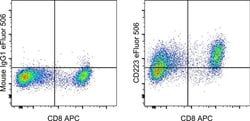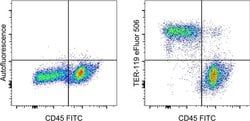7193227
TCR V beta 5.1/5.2 Monoclonal Antibody (MR9-4), Alexa Fluor™ 700, eBioscience™, Invitrogen™
Mouse Monoclonal Antibody
Manufacturer: Fischer Scientific
The price for this product is unavailable. Please request a quote
Antigen
TCR V beta 5.1/5.2
Concentration
0.2 mg/mL
Classification
Monoclonal
Form
Liquid
Regulatory Status
RUO
Formulation
PBS with 0.09% sodium azide; pH 7.2
Isotype
IgG1 κ
Purification Method
Affinity chromatography
Product Type
Antibody
Clone
MR9-4
Applications
Flow Cytometry
Conjugate
Alexa Fluor 700
Host Species
Mouse
Target Species
Mouse
Gene Alias
TCR V beta5.1; TCR V beta5.2; TCRV beta 5.1; TCRV beta 5.2; TCRV beta5.1; TCRV beta5.2; Vb5.1; Vb5.2; Vbeta5.1; Vbeta5.2
Primary or Secondary
Primary
Content And Storage
4° C, store in dark, DO NOT FREEZE!
Description
- Description: This MR9-4 monoclonal antibody reacts with the mouse T cell receptor (TCR) V beta 5.1/5.2 chain
- Composed of an alpha and beta chain, TCR specificity is typically determined by Va, Ja, Vb, Db, and Jb gene rearrangement
- The MR9-4 antibody recognizes the V beta 5.1 and 5.2 chains on T cells from mouse strains with the b haplotype of the Tcrb gene, including C57BL/6, B10, and C58/J
- V beta 5.1 and 5.2 are deleted in mouse strains that express MHC Class II I-E, including Balb/c, C3H, and DBA/2
- Reports also indicate that V beta 5+ T cells recognize the OVA peptide
- Applications Reported: This MR9-4 antibody has been reported for use in flow cytometric analysis
- Applications Tested: This MR9-4 antibody has been tested by flow cytometric analysis of mouse splenocytes
- This may be used at less than or equal to 1 μg per test
- A test is defined as the amount (μg) of antibody that will stain a cell sample in a final volume of 100 μL
- Cell number should be determined empirically but can range from 10^5 to 10^8 cells/test
- It is recommended that the antibody be carefully titrated for optimal performance in the assay of interest
- Alexa Fluor 700 emits at 723 nm and can be excited with the red laser (633-647 nm)
- Most instruments will require a 685 LP mirror and 710/20 band pass filter
- Please make sure that your instrument is capable of detecting this fluorochrome
- Excitation: 633-647 nm; Emission: 723 nm; Laser: Red Laser The ability of T cell receptors (TCR) to discriminate foreign from self-peptides presented by major histocompatibility complex (MHC) class II molecules is essential for an effective adaptive immune response
- TCR recognition of self-peptides has been linked to autoimmune disease
- Mutant self-peptides have been associated with tumors
- Engagement of TCRs by a family of bacterial toxins know as superantigens has been responsible for toxic shock syndrome
- Autoantibodies to V beta segments of T cell receptors have been isolated from patients with rheumatoid arthritis (RA) and systemic lupus erythematosus (SLE)
- The autoantibodies block TH1-mediated inflammatory autodestructive reactions and are believed to be a method by which the immune system compensates for disease
- Most human T cells express the TCR alpha-beta and either CD4 or CD8 molecule (single positive, SP)
- A small number of T cells lack both CD4 and CD8 (double negative, DN)
- Increased percentages of alpha-beta DN T cells have been identified in some autoimmune and immunodeficiency disorders
- Gamma-delta T cells are primarily found within the epithelium
- They show less TCR diversity and recognize antigens differently than alpha-beta T cells
- Subsets of gamma-delta T cells have shown antitumor and immunoregulatory activity.
Compare Similar Items
Show Difference
Antigen: TCR V beta 5.1/5.2
Concentration: 0.2 mg/mL
Classification: Monoclonal
Form: Liquid
Regulatory Status: RUO
Formulation: PBS with 0.09% sodium azide; pH 7.2
Isotype: IgG1 κ
Purification Method: Affinity chromatography
Product Type: Antibody
Clone: MR9-4
Applications: Flow Cytometry
Conjugate: Alexa Fluor 700
Host Species: Mouse
Target Species: Mouse
Gene Alias: TCR V beta5.1; TCR V beta5.2; TCRV beta 5.1; TCRV beta 5.2; TCRV beta5.1; TCRV beta5.2; Vb5.1; Vb5.2; Vbeta5.1; Vbeta5.2
Primary or Secondary: Primary
Content And Storage: 4° C, store in dark, DO NOT FREEZE!
Antigen:
TCR V beta 5.1/5.2
Concentration:
0.2 mg/mL
Classification:
Monoclonal
Form:
Liquid
Regulatory Status:
RUO
Formulation:
PBS with 0.09% sodium azide; pH 7.2
Isotype:
IgG1 κ
Purification Method:
Affinity chromatography
Product Type:
Antibody
Clone:
MR9-4
Applications:
Flow Cytometry
Conjugate:
Alexa Fluor 700
Host Species:
Mouse
Target Species:
Mouse
Gene Alias:
TCR V beta5.1; TCR V beta5.2; TCRV beta 5.1; TCRV beta 5.2; TCRV beta5.1; TCRV beta5.2; Vb5.1; Vb5.2; Vbeta5.1; Vbeta5.2
Primary or Secondary:
Primary
Content And Storage:
4° C, store in dark, DO NOT FREEZE!
Antigen: CD357 (AITR/GITR)
Concentration: 5 μL/Test
Classification: Monoclonal
Form: Liquid
Regulatory Status: RUO
Formulation: PBS with 0.2% BSA and 0.09% sodium azide; pH 7.2
Isotype: IgG1 κ
Purification Method: Affinity chromatography
Product Type: Antibody
Clone: eBioAITR
Applications: Flow Cytometry
Conjugate: APC-eFluor 780
Host Species: Mouse
Target Species: Human
Gene Alias: Activation-inducible TNFR family receptor; AITR; CD357; GITR; GITR-D; glucocorticoid-induced TNFR-related protein; PRO364; TNF receptor superfamily activation-inducible protein; TNF receptor superfamily member 18; TNFRSF18; Tumor necrosis factor receptor superfamily member 18; tumor necrosis factor receptor superfamily, member 18; UNQ319; UNQ319/PRO364
Primary or Secondary: Primary
Content And Storage: 4° C, store in dark, DO NOT FREEZE!
Antigen:
CD357 (AITR/GITR)
Concentration:
5 μL/Test
Classification:
Monoclonal
Form:
Liquid
Regulatory Status:
RUO
Formulation:
PBS with 0.2% BSA and 0.09% sodium azide; pH 7.2
Isotype:
IgG1 κ
Purification Method:
Affinity chromatography
Product Type:
Antibody
Clone:
eBioAITR
Applications:
Flow Cytometry
Conjugate:
APC-eFluor 780
Host Species:
Mouse
Target Species:
Human
Gene Alias:
Activation-inducible TNFR family receptor; AITR; CD357; GITR; GITR-D; glucocorticoid-induced TNFR-related protein; PRO364; TNF receptor superfamily activation-inducible protein; TNF receptor superfamily member 18; TNFRSF18; Tumor necrosis factor receptor superfamily member 18; tumor necrosis factor receptor superfamily, member 18; UNQ319; UNQ319/PRO364
Primary or Secondary:
Primary
Content And Storage:
4° C, store in dark, DO NOT FREEZE!
Antigen: CD223 (LAG-3)
Concentration: 5 μL/Test
Classification: Monoclonal
Form: Liquid
Regulatory Status: RUO
Formulation: PBS with 0.2% BSA and 0.09% sodium azide; pH 7.2
Isotype: IgG1 κ
Purification Method: Affinity chromatography
Product Type: Antibody
Clone: 3DS223H
Applications: Flow Cytometry
Conjugate: eFluor 506
Host Species: Mouse
Target Species: Human
Gene Alias: Activation-induced cytidine deaminase-linked autoimmunity protein; Aida; CD223; FDC; LAG3; LAG-3; Ly66; lymphocyte activating 3; lymphocyte activation gene 3 protein; lymphocyte-activation gene 3; Secreted lymphocyte activation gene 3 protein; sLAG 3; sLAG3; sLAG-3; soluble LAG 3lymphocyte activating 3; soluble LAG3
Primary or Secondary: Primary
Content And Storage: 4° C, store in dark, DO NOT FREEZE!
Antigen:
CD223 (LAG-3)
Concentration:
5 μL/Test
Classification:
Monoclonal
Form:
Liquid
Regulatory Status:
RUO
Formulation:
PBS with 0.2% BSA and 0.09% sodium azide; pH 7.2
Isotype:
IgG1 κ
Purification Method:
Affinity chromatography
Product Type:
Antibody
Clone:
3DS223H
Applications:
Flow Cytometry
Conjugate:
eFluor 506
Host Species:
Mouse
Target Species:
Human
Gene Alias:
Activation-induced cytidine deaminase-linked autoimmunity protein; Aida; CD223; FDC; LAG3; LAG-3; Ly66; lymphocyte activating 3; lymphocyte activation gene 3 protein; lymphocyte-activation gene 3; Secreted lymphocyte activation gene 3 protein; sLAG 3; sLAG3; sLAG-3; soluble LAG 3lymphocyte activating 3; soluble LAG3
Primary or Secondary:
Primary
Content And Storage:
4° C, store in dark, DO NOT FREEZE!
Antigen: TER-119
Concentration: 0.2 mg/mL
Classification: Monoclonal
Form: Liquid
Regulatory Status: RUO
Formulation: PBS with 0.09% sodium azide; pH 7.2
Isotype: IgG2b κ
Purification Method: Affinity chromatography
Product Type: Antibody
Clone: TER-119
Applications: Flow Cytometry
Conjugate: eFluor 506
Host Species: Rat
Target Species: Mouse
Gene Alias: Ly76; Ly-76; TER119
Primary or Secondary: Primary
Content And Storage: 4° C, store in dark, DO NOT FREEZE!
Antigen:
TER-119
Concentration:
0.2 mg/mL
Classification:
Monoclonal
Form:
Liquid
Regulatory Status:
RUO
Formulation:
PBS with 0.09% sodium azide; pH 7.2
Isotype:
IgG2b κ
Purification Method:
Affinity chromatography
Product Type:
Antibody
Clone:
TER-119
Applications:
Flow Cytometry
Conjugate:
eFluor 506
Host Species:
Rat
Target Species:
Mouse
Gene Alias:
Ly76; Ly-76; TER119
Primary or Secondary:
Primary
Content And Storage:
4° C, store in dark, DO NOT FREEZE!
